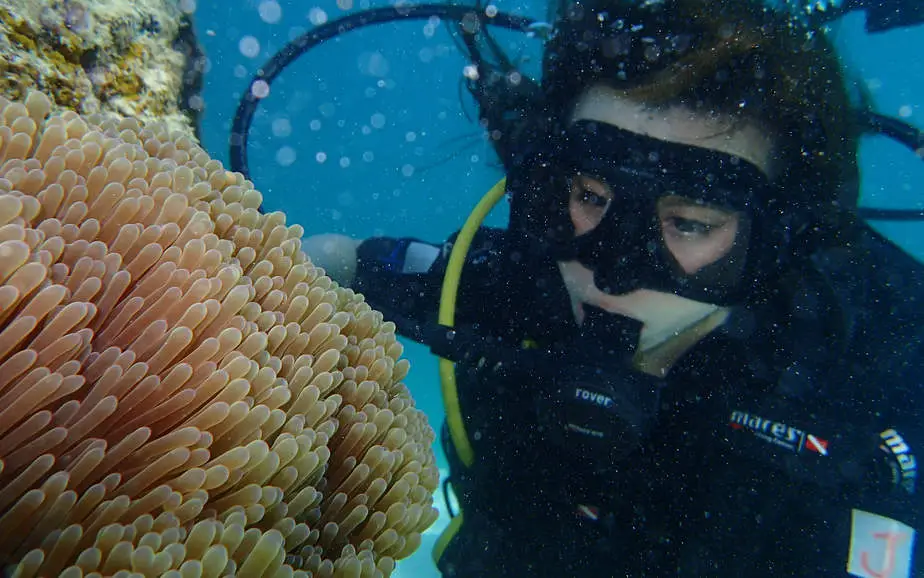Breathing compressed air and exposing your body to extreme water pressure seems like it’d pose a serious health risk. Yet, that’s exactly what scuba divers do each time they dive. Even if, hypothetically, the occasional dive doesn’t cause any harm, would scuba diving be bad for your health if you’ve been doing it consistently for years?
According to this 2017 study by the European Respiratory Society, there is some evidence that scuba diving can be bad for your lungs, both short and long term. However, its effects are different from person to person. If you are someone who has a medical condition affecting your lungs, it may be possible that even single shallow-water scuba dives can have deleterious effects on your lung health. That said, for most individuals any changes in lung function from single dives were due to decompression stress, ambient cold temperatures, and immersion; they were not likely to result in accelerated worsening of lung function over time. In general, recreational scuba diving isn’t bad for most people’s health.
When it comes to medical concerns, you had best discuss it with a doctor. Get a medical check-up at least once or twice a year if you plan on scuba diving regularly. As for the other risks associated with scuba diving, this article will show you how to avoid them with some practical tips. We’ll also let you in on some benefits that scuba diving provides. Let’s dive in.
Is scuba diving dangerous?
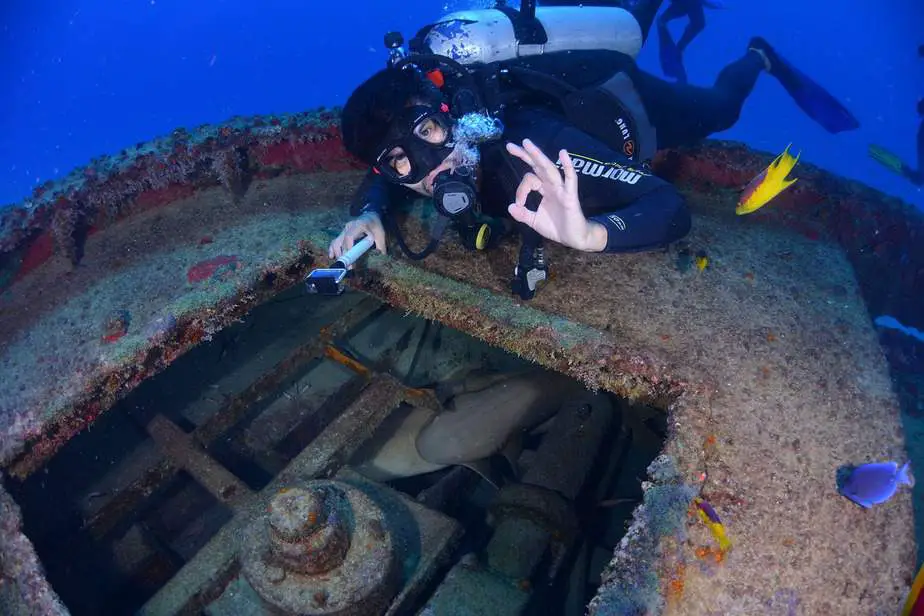
It depends what kind of diving you’re doing. As far as recreational scuba diving is concerned, it is incredibly safe. The reason why scuba diving as a whole is considered an extreme sport is because deep sea diving, wreck diving, cave diving, drift diving, and various other advanced types of diving are all included within that term.
Even as a whole, scuba diving has an exceptional safety record. Considering millions of dives are conducted each year, fatalities unfortunately do occur occasionally. However, what leads to a death is typically due to diver error.
Newbie divers are more likely to panic when something unexpected happens and ascend quickly to the surface. They are also less experienced to deal with equipment malfunctions such as a free-flowing regulator or a dive computer dying.
Sometimes a diver forgets to check their pressure gauge and finds that they are running dangerously low on breathing gas. Another common mistake is to exceed one’s depth limits which puts them at greater risk of decompression sickness and running out of breathing gas faster.
In rare cases, divers will deliberately dive beyond their depth limits because they think they are being daredevils, but in reality, they are jeopardizing their safety for no reason. Most of the time the mistake was accidental, caused by unforeseen circumstances.
There is also the risk of a medical emergency happening underwater. Whenever a diver loses their life due to an undetected medical condition, it’s always a tragedy. To reduce the likelihood of this occurring, divers are asked to fill out a medical form. Depending on their answers, they may be asked to be medically cleared by a doctor before they are allowed to dive.
Scuba diving dangers to keep in mind
Pressure injuries
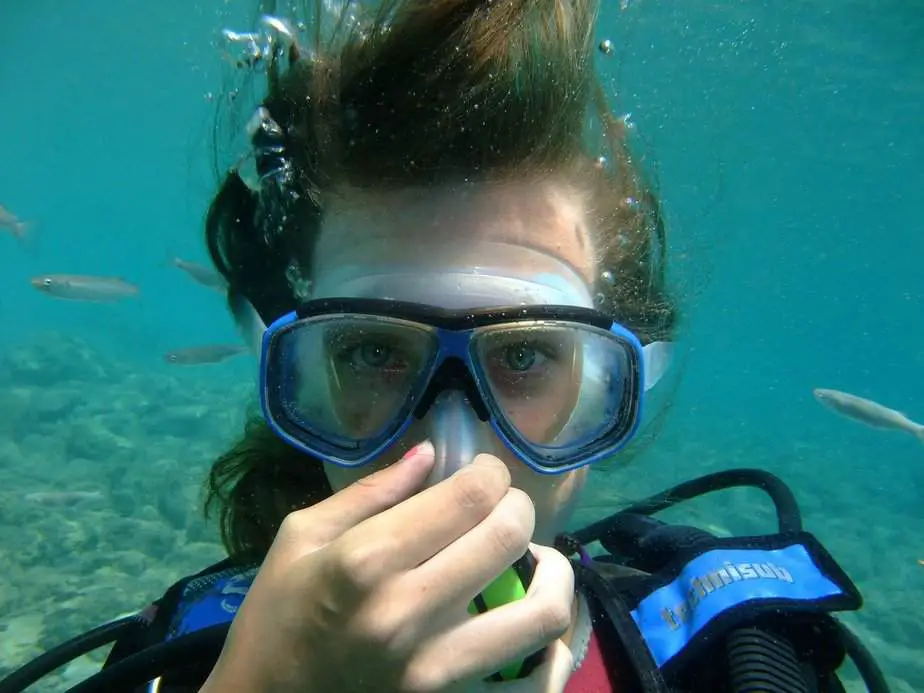
The most common pressure-related injuries are facial barotrauma and ear barotrauma. Barotrauma are injuries caused by the pressure squeezing the affected body part due to descending too quickly without equalizing their ear, sinus, or mask before causing them pain.
One of the golden rules of scuba diving is to equalize early and often. Equalizing the mask is as simple as exhaling from the nose. There are many equalization techniques to clear the ears and sinuses, however the most straightforward one is the Valsalva maneuver.
Performing it involves pinching your nose through the nose pocket of your mask and gently trying to exhale through the pinched nose. Since the air is blocked off, instead it diverts to your eustachian tubes (the tubes connecting your ear canal and sinus), equalizing the pressure there. There are hands-free ways of doing this which freedivers must know, however scuba divers have the luxury of just doing the Valsalva maneuver.
Since pressure injuries occur when descending too fast, it’s a good reason to descend slowly. Descending slowly also has the benefit of allowing you to compose yourself and look around. You don’t want to crash onto the seafloor or directly on a coral or rock.
As your buoyancy control skills improve, you can descend more quickly while still staying safe. Always maintain a rate of descent that is similar to your dive buddy, so that you can stay in visual contact with each other.
Avoid diving with a cold or a congested nose, because this can make equalizing difficult or impossible. If you feel a squeeze and cannot seem to equalize it, communicate with your dive buddy that you are having equalization issues.
The typical procedure is to ascend slowly to alleviate some of the pressure and see if you can equalize at a higher depth. If you still cannot equalize, then signal to your partner that you’re ending the dive.
Forcefully trying to equalize can also damage your ears and sinuses just as much as the pressure can. If you fail to equalize the mask squeeze, you can end up with extremely bruised, puffy eyes. If you fail to equalize your ears, then your eardrums can burst. Needless to say, it’d be very painful and something you want to avoid.
Decompression sickness
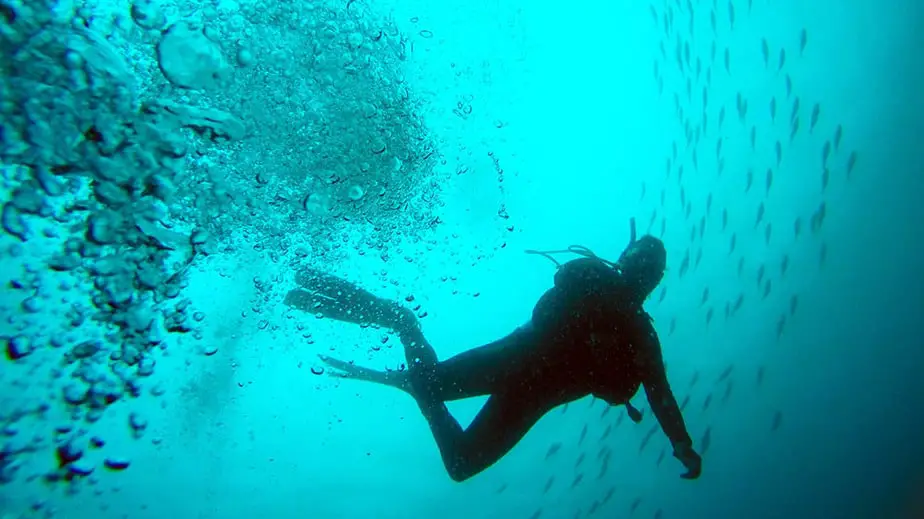
The biggest risk divers face when scuba diving is decompression sickness. Decompression sickness, also known as “the bends”, is a term for any adverse effects a diver feels as a result of nitrogen gas that have been absorbed into their tissues doing the day coming out of solution too quickly, forming bubbles, and entering their bloodstream.
These bubbles often accumulate in the joints which can cause them to feel extremely stiff and bent out of shape, which is where its name came from. Additionally minor symptoms of decompression sickness include rash, extreme fatigue, loss of balance or vision, and loss of consciousness.
The biggest issue is when the bubbles reach critical areas such as the brain or spine. This can lead to permanent injury, including paralysis and even death. Thus, decompression sickness is not something to be taken lightly.
There is a reason why recreational divers must pay close attention to their no-decompression limit (NDL), which is a calculation of how much time they can stay underwater while still being able to ascend directly to the surface without decompression stops.
Despite adhering to the NDL, divers are still recommended to ascend slowly and to perform a 3-minute safety stop 3-5 meters away from the surface to give their body some time to off-gas (release excess gas from their system). This simple safety measure can drastically reduce the chances of decompression sickness.
Your chances of getting decompression sickness increases if you are: a smoker, tired, obese, diving when tired, drunk, or dehydrated. It’s generally a good idea to be in decent physical shape and to avoid being under the influence of any of the factors described.
Also be wary of flying after diving. It’s not just flying that’s the problem, but ascending from a low elevation to a high elevation. In other words, hiking or driving up a mountain is also something you should avoid doing soon after diving. Elevated areas have a lower atmospheric pressure, which means more nitrogen gas will come out from your system and possibly form bubbles.
When someone is affected by decompression sickness, they need to be breathing pure oxygen (so as not to add more nitrogen into their system), kept warm, and be taken to a hyperbaric chamber for treatment.
Gas narcosis
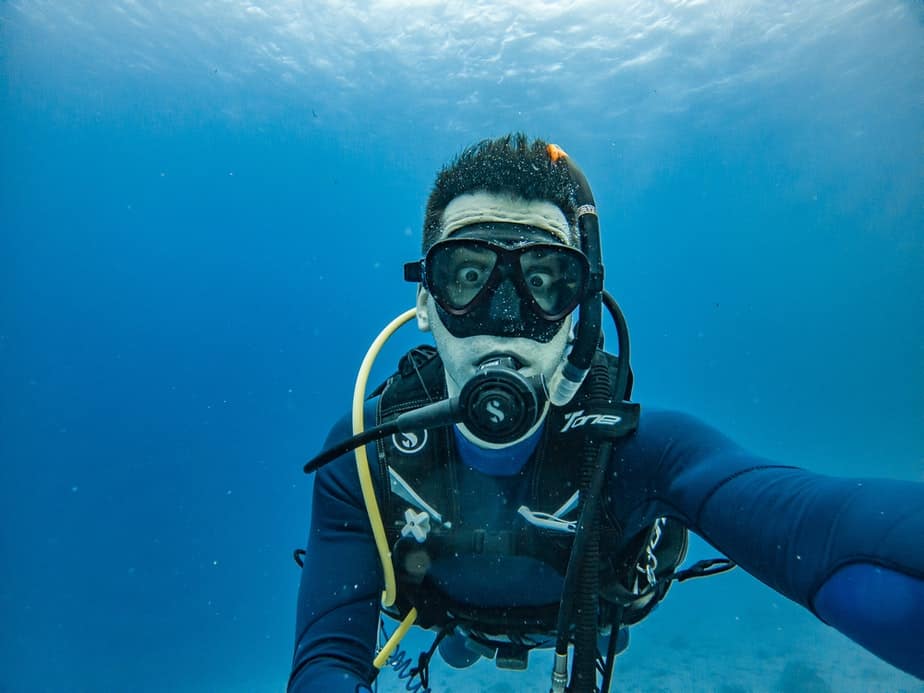
Nitrogen narcosis, or gas narcosis, refers to the physical and mental impairment that temporarily affects divers at deep depths due to breathing in too much compressed nitrogen. The effects of gas narcosis are eerily similar to being drunk.
Divers who have been affected by it describe feelings of euphoria and feeling of oneness with the water. They display a lack of poor judgment, poor coordination, and struggle to focus. Narcosis itself is not dangerous, however the actions you might take while under its effects might be.
For instance, divers have been known to remove their regulator because they thought they could breathe underwater. Some divers have ignored depth limits and other crucial warnings.
Gas narcosis can begin to affect divers breathing compressed air starting from a depth of 30 m / 100 ft. Since the recreational diving limit is 40 m / 130 ft, divers near those depths will begin to be affected by narcosis.
The solution to gas narcosis is either to avoid diving deeply, or learn about technical diving, specifically diving trimix. In short, trimix adds helium into the mix. Helium is an inert, stable gas that does not have the same narcotic effects as compressed air making it the best gas for deep diving. Divers will breathe trimix once they have reached depths where narcosis would normally take place.
Oxygen toxicity
Another risk of breathing compressed air deep underwater is oxygen toxicity. Breathing too much oxygen can actually be toxic for us. On land this is not an issue. Underwater, when air gets compressed, each breath underwater is the equivalent of multiple breaths at sea level.
With that said, the depth limit where oxygen becomes toxic is over 55 m / 180 ft, so this will never be an issue for the recreational diver. For deep, technical divers, oxygen toxicity is as much a concern as gas narcosis and decompression sickness, which is why they need to carefully manage their breathing gas.
Lung injury
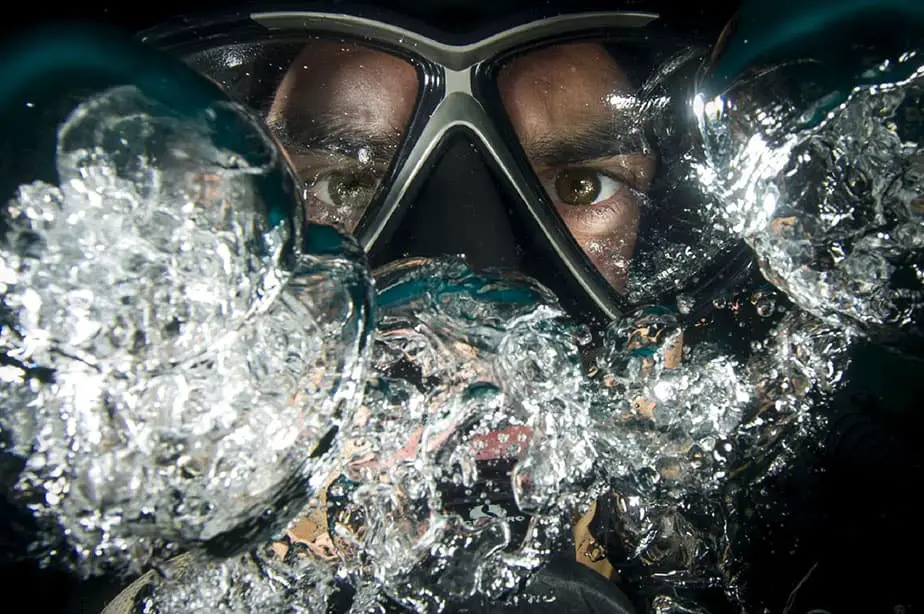
Another golden rule of scuba diving is to always be breathing. Said another way, never hold your breath while scuba diving. This is arguably one of the most important rules to follow, on the same level as ascending slowly, because you can easily die if you forget it.
How? When a diver holds their breath after breathing compressed air and ascends, the compressed air in their lungs will expand while their lung stays the same size because they are holding their breath (the air has nowhere to go as its volume increases).
As you ascend higher and higher, the air inside expands so much that it can literally rupture your lungs. As long as you breathe continuously, the air will safely leave your lungs when you exhale.
You might be wondering how come freedivers can dive hundreds of feet deep and rapidly ascend without their lungs rupturing? The reason is that the amount of air in their lungs at surface level is already at the greatest level of “expansion.” As a freediver descends, the air volume in their lungs will only ever get smaller, and it will expand back to its original volume during the ascent, never more than that. Thus, a freediver’s lungs are not at risk of rupturing since they aren’t breathing in compressed air that can expand further than their lung capacity.
However, one problem that freedivers and scuba divers have in common is a risk of drowning.
Drowning
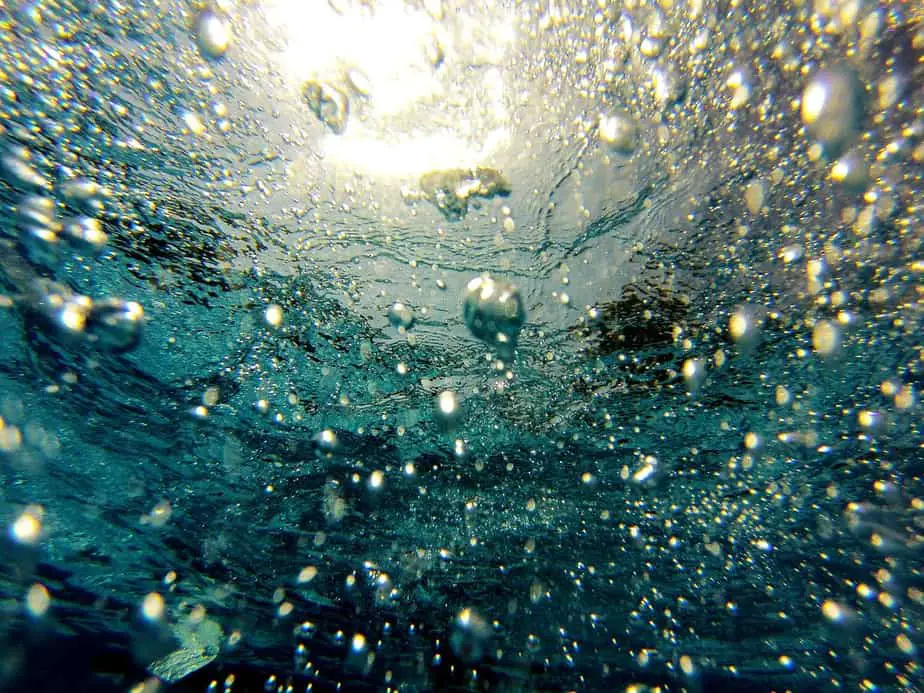
You might be surprised that most drowning fatalities while scuba diving occurred at the surface. Regardless of whether you’re at the surface or underwater, you need to take measures to prevent it from happening.
Here are some tips to reduce the likelihood of drowning at the surface. As soon as you dive into the water, fully inflate your BCD to ensure you have positive buoyancy. If for some reason you are struggling to stay afloat at the surface, don’t hesitate to release your dive weights.
If you have a snorkel, this is the time to use it to conserve your energy and breathing gas. When the weather conditions are rough, don’t worry about conserving gas and just use it at the surface. If you choke on water, especially when breathing with the snorkel, it is crucial to remain calm. Do not flail around and overexert yourself.
While underwater, you must regularly check your pressure gauge and check with your buddy regarding their remaining gas. It’s good to remind each other because the time just flies by when you’re having fun.
Maintain good buddy contact so that if you run out of gas you can share your buddy’s breathing gas as you ascend. When a regulator malfunctions and free-flows, stay calm. Signal to your buddy that you have a problem and that you need to borrow their air.
Don’t dive deeper than your planned depth. Always surface with at least 500 psi of pressure left. You never know when something unexpected might happen during the ascent that can delay you.
When you are being swept away by a current, don’t try to swim directly against it. You will overexert yourself and you’ll still lose. Try to swim to the bottom or to the outer edges where the current is weakest to break out of it. Whenever you suddenly have to exert yourself like this, check your pressure gauge, because you probably used up a bunch of air.
Lastly, don’t dive unless you’re medically cleared to. If you suffer a medical emergency underwater and that medical emergency doesn’t kill you, the water will. Even if your dive buddy saves you, the time it takes to get you to a hospital might be fatal as well.
Equipment malfunction
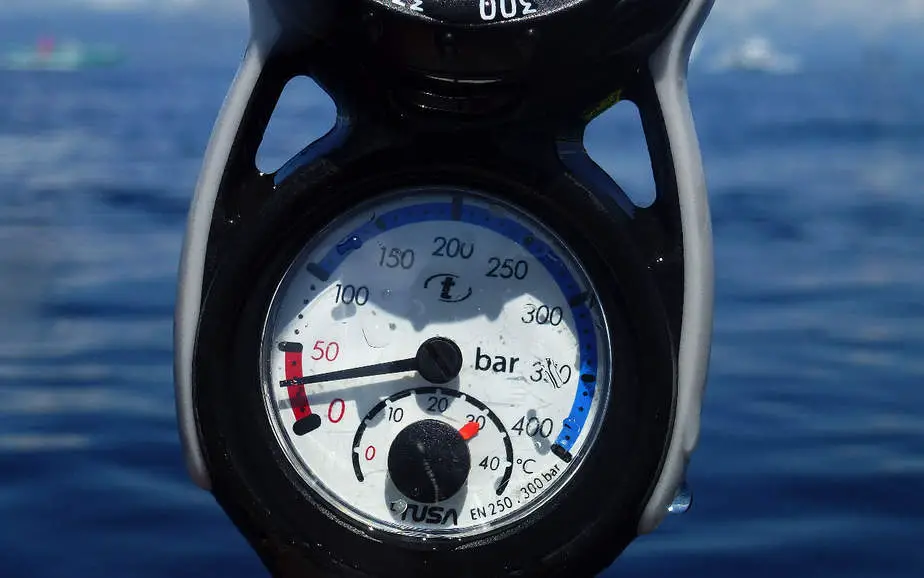
Equipment failure sometimes happens and it can be very dangerous if you don’t have a backup. However, there are some practical steps you can follow to mitigate this risk.
While you’re on the boat, before a dive, you must do a pre-dive check of all your equipment. Check that your dive computer is fully charged, the batteries on your dive lights are new, the gas mxi in your tank is exactly what it says on the label, etc.
Do a full buddy check to ensure that your buddy’s gear is in good condition as well. Discuss your dive plan, exit point, what to do in an emergency, and so on. That way, if something does happen, you or your dive buddy can react much faster.
Always stay close with your dive buddy at all points during the dive. You need them as much as they need you because no one can predict what might happen while diving.
After your dive, make sure you thoroughly rinse your gear with freshwater and dry and store it correctly. The scuba cylinder should have some air in it and be placed in a tank holder or standing up, never on its side.
Bring a backup of your most essential equipment, such as a backup dive computer, dive light, mini tank, or anything else you deem necessary. If your primary equipment fails and you need to resort to your backup, it’s time to end the dive. The purpose of backups are so that you can safely ascend, not so that you can continue diving.
Encounters with marine life
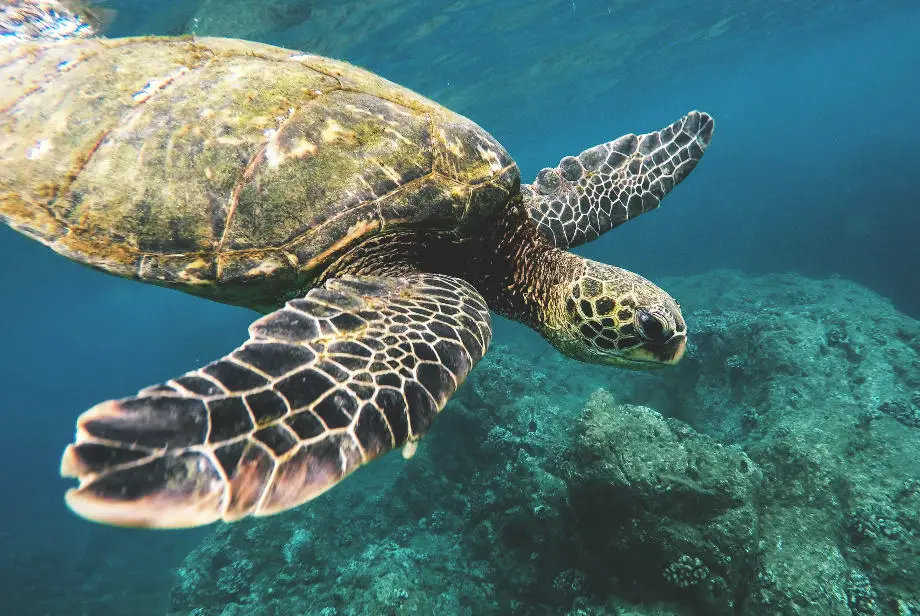
One of the joys of scuba diving is being able to observe marine life in person instead of at an aquarium or with a screen in-between. However, this close proximity with the creatures entices many a diver to want to reach out and interact with the sea life. Unfortunately, many divers quickly realize what a terrible mistake they’d just made.
Many injuries are caused by marine life acting out in self-defense because they felt threatened or cornered. It may not have been an intentional provocation on your part, yet to them, they may lash out because they were scared. Thereful, you must be careful where you put your hands and feet while diving, and you should keep your distance on top of that.
A responsible diver knows that they should only look, not touch, anything underwater. Even poking or prodding something so that you can get a better view or take a better photograph is considered provoking or harassing it. Even something inanimate, such as coral, should not be touched because they are brittle and can sting you on contact.
Animals can respond violently in various ways. They can bite, sting, or lash out at you. Even if you’re wearing a wetsuit, the wetsuit only offers protection against the cold, not against sharp teeth or a stinger. Take some time to learn about common aquatic injuries and how to treat them in case you accidentally become a victim of a marine-life attack. It can feel very unpleasant, and may even be deadly in some circumstances.
Sunburn and dehydration
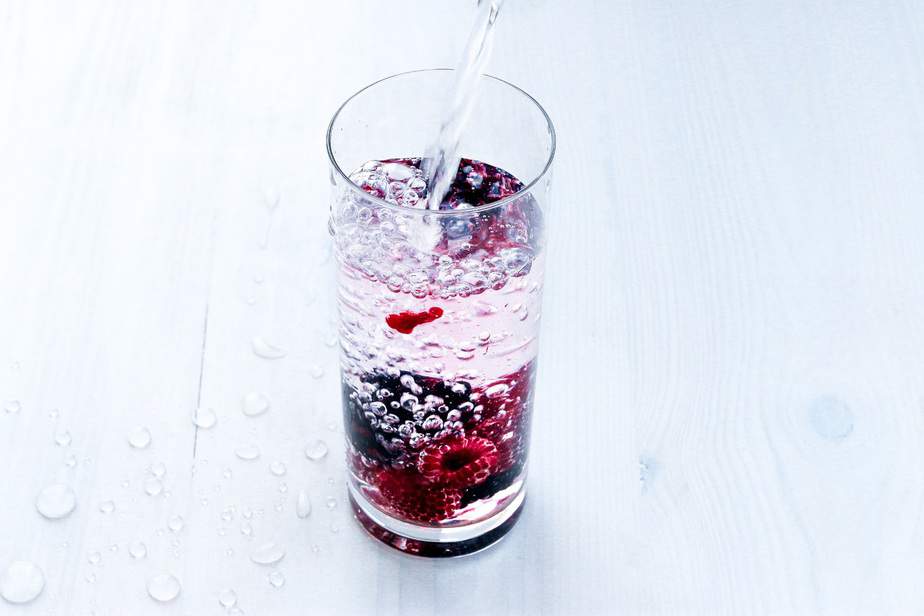
Holiday divers know too well the pain of missing a day of diving because they forgot to apply sunscreen the day before. It’s really easy to get sunburnt if you’re not diligently applying and reapplying sunscreen every couple of hours or wearing clothing with a UPF rating. You’d still need to apply sunscreen on the areas that aren’t covered by your clothing.
Sunburn can be incredibly painful, especially if you want to squeeze into a wetsuit for your next dive. Dehydration can be similarly unpleasant and can make it dangerous for your next dive. When you’re in the sun, you can lose a lot of fluid from sweating, so make sure to drink plenty of water to replenish your fluid loss.
Dehydration makes you more susceptible to decompression sickness. Furthermore, the immersion diuresis that diving causes will make you want to pee, causing even more fluid loss. It’s also the same reason why you shouldn’t drink alcohol, tea, or coffee before diving because of their diuretic effects (in the case of alcohol, there are plenty more reasons not to drink it).
So while you’re not diving, we recommend staying in the shade, wearing plenty of sunscreen and sun protection clothing, as well as staying hydrated.
Is scuba diving bad for your heart?
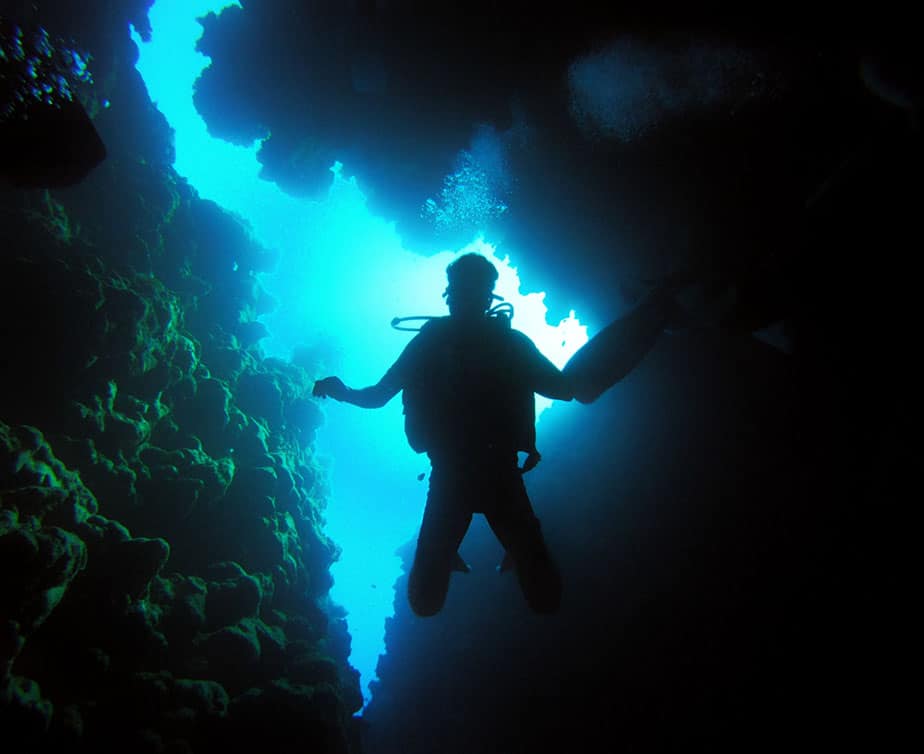
Scuba diving is a great way to exercise which can increase your overall health, including heart health. With that said, it can be physically demanding which places stress on the heart which can be good or bad depending on the diver’s underlying health. All exercise will force the heart to work harder, the question is can their heart handle this stress?
Even though recreational diving generally requires little exertion, there are times when sudden and unforeseen circumstances cause the diver to engage in strenuous physical activity, such as a need to swim out of a current or to swim away from some kind of danger.
Thus, it’s recommended that divers are in good physical shape even before diving so that their heart can suddenly work at max capacity if needed. While there is no weight or fitness requirement for scuba diving other than what you were tested on during the Open Water Diver course, you should ideally be comfortable with moderate exercise.
Furthermore, just being underwater puts extra stress on your heart due to the water temperature and pressure. Your body will shift blood from your extremities and limbs and concentrate it in the central areas, and it’s your heart’s job to do that.
In healthy individuals who are accustomed to regular exercise, this should pose no problem for their heart which is already used to increased workloads. On the other hand, someone who has heart problems, perhaps due to an underlying medical condition or due to obesity, may not be able to dive. They’d need to be medically cleared by their doctor before dive shops will allow them on a boat.
For an average healthy individual, scuba diving can be a great way to train their heart and improve their health. For individuals with a medical condition affecting their heart, a doctor will have to medically clear them for diving.
Is scuba diving bad for your lungs?
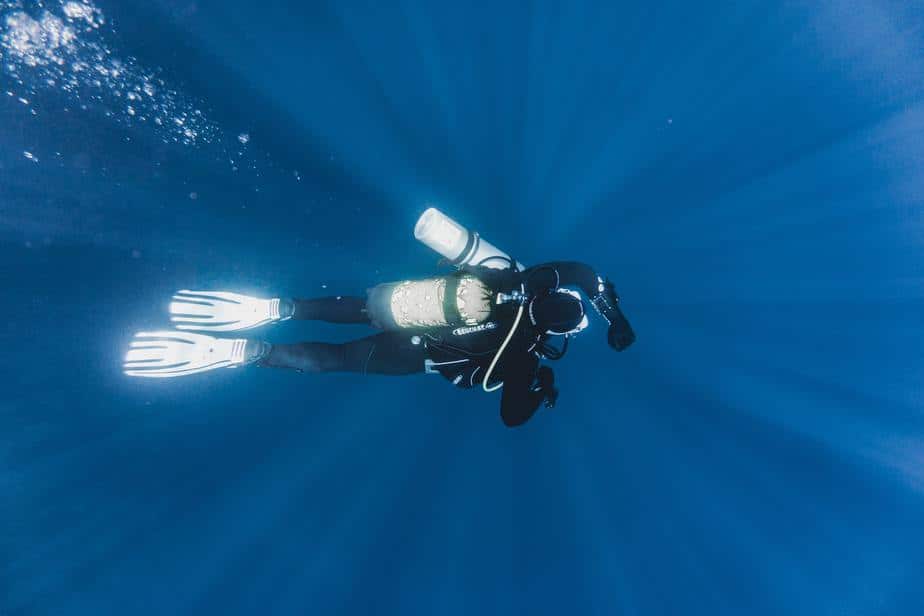
According to a 2017 study on the short and long-term effects of diving on pulmonary function done by the European Respiratory Society (ERS), they found that:
“Several factors associated with diving affect pulmonary function acutely and can potentially cause prolonged effects that may accumulate gradually with repeated diving exposure. Evidence from experimental deep dives and longitudinal studies suggests long-term adverse effects of diving on the lungs in commercial deep divers, such as the development of small airways disease and accelerated loss of lung function.”
So deep divers, who are often diving at depths of 200 – 300 ft and breathing various gas mixes, may be exposed to “accelerated loss of lung function.”
With that said, what about recreational scuba divers who just breathe compressed air? The vacation divers or those who dive just once or twice just to cross if off their bucket list? The study had this to say:
“[T]here is an accumulating body of evidence that diving with self-contained underwater breathing apparatus (scuba) may not be associated with deleterious effects on pulmonary function.”
“Recent evidence points to no accelerated loss of lung function in military or recreational scuba divers over time. Thus, the impact of diving on pulmonary function largely depends on factors associated with the individual diving exposure.” (Emphasis mine).
In other words, if you are worried about scuba diving negatively affecting your lungs, then you have to consider: how deep do you dive, and do you know about any existing heart condition affecting you? Depending on the individual, even single recreational dives can be bad for your lungs, or it could be completely fine. You’d have to ask a doctor to know for sure.
And it bears repeating, never hold your breath while diving. Be continuously breathing at all times. If you hold your breath, you run the risk of rupturing your lungs during the ascent.
Pre-existing medical conditions and scuba diving
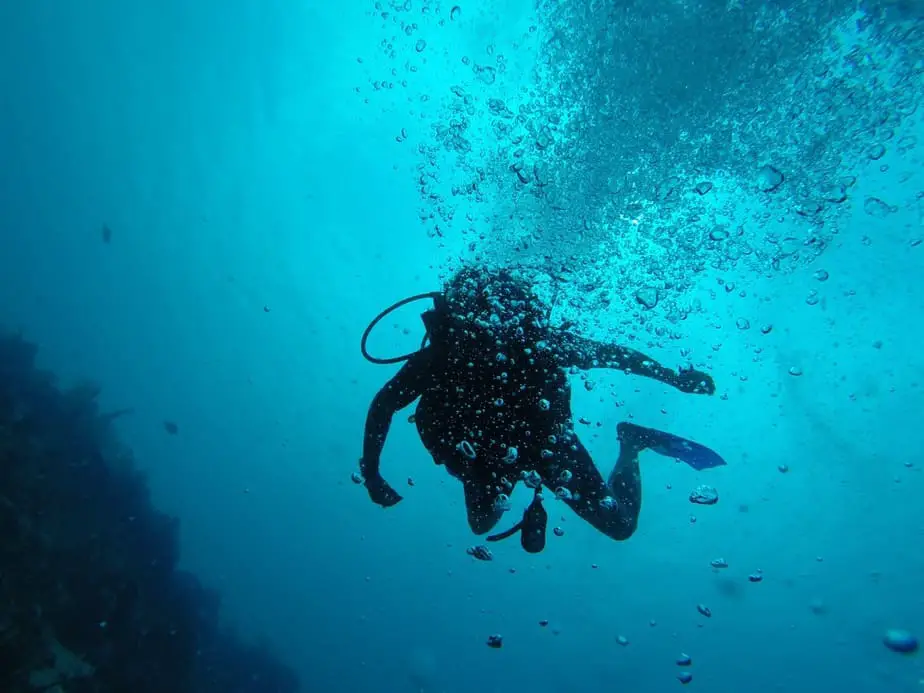
Before you are allowed to go out on a dive, you will be asked to complete a medical form. The medical form is designed by the Undersea and Hyperbaric Medical Society (UHMS) and used by PADI, SSI, NAUI, and various other diver training agencies to screen scuba diving suitability for divers.
Please do not lie on the medical. The goal of it is not to prevent people from diving, quite the opposite. The goal is to get as many people to dive as safely as possible. If you do have a medical condition, scuba doctors will try to help you work around it. If you have an existing condition that you know would make it dangerous for you to dive, then you should probably stay away from scuba diving.
You can check out the full UHMS evaluation form to see exactly what kinds of medical conditions are problematic and need to be discussed with a doctor. Again, the goal is not to limit the number of divers, but to ensure that all divers are diving safely.
To be safe, you need to meet with a scuba diving doctor, also known as hyperbaric doctors, who specializes in this field. They will have a better understanding of any sort of contraindications regular medications might have on the body when exposed to the increased pressure of scuba diving.
Unfortunately, a sobering and unavoidable truth is that our health will deteriorate over time. Staying fit and healthy can keep these problems at bay for a long time, however they will eventually catch up to you. You may find new medical concerns arise as you get older.
The UHMS questionnaire asks questions related to high blood pressure, smoking, cholesterol levels, family history of heart attack, heart disease, stroke, and so on to divers over the age of 45. Past this age, you should be getting a medical checkup at least once a year if you want to regularly scuba dive.
Even if it’s not time for your checkup, if you experience any health changes, you had best get checked over by a doctor to ensure you’re still fit to dive. Diving doctors will work with divers to see if they can make lifestyle or medication changes so that they can still dive.
Can scuba diving be good for your health?
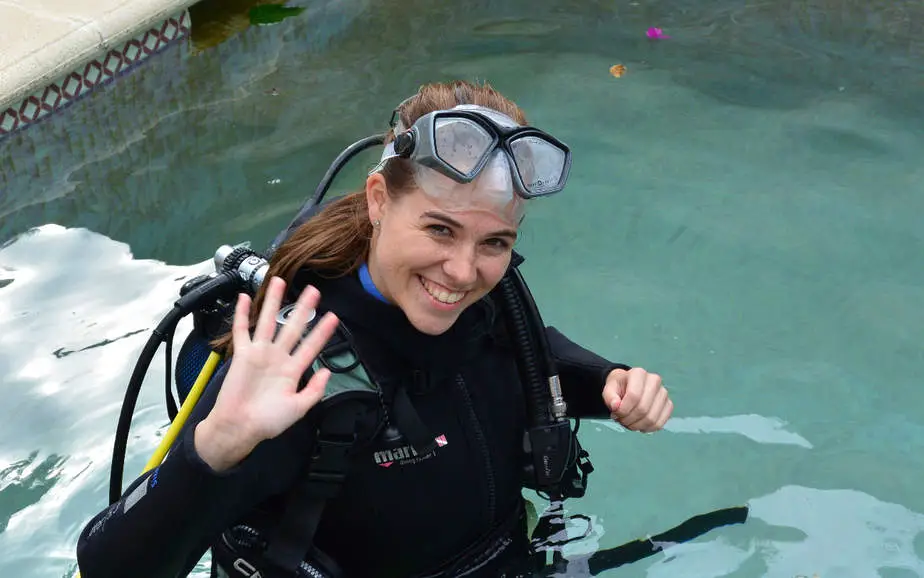
While there are some medical risks involved with scuba diving, it has much the same health risks as any other sport. Scuba diving also has much of the same benefits that exercise provides, assuming you are a normal healthy individual.
A typical scuba diving session can help you burn anywhere from 300-600 calories per hour. This is about equivalent to jogging for the same amount of time. The wide range in calories burned depends on the type of diving you’re doing, the water temperature, and water conditions.
If you’re doing a boat dive in warm waters where you spend your time simply observing, then the calories burned will be on the lower end of that range. If you’re doing a cold water diver where you are constantly fighting against currents, then the number will be on the higher end of that range.
How does scuba diving help you burn so much calories? For starters, you need to carry a lot of heavy and bulky scuba equipment. On land, you can be carrying an extra 40-50 lbs of gear before you enter the water. Underwater, you now have to deal with water resistance and currents.
Maneuvering yourself underwater with all of this gear can be quite physically demanding. It’s not unusual to notice that your legs and core have developed some muscle tone when regularly diving, which can improve back health and posture.
The calories burned may also result in weight loss, though you might work up quite an appetite after a dive session and it’s easy to cancel out the caloric deficit if you binge eat.
Is scuba diving bad for you?
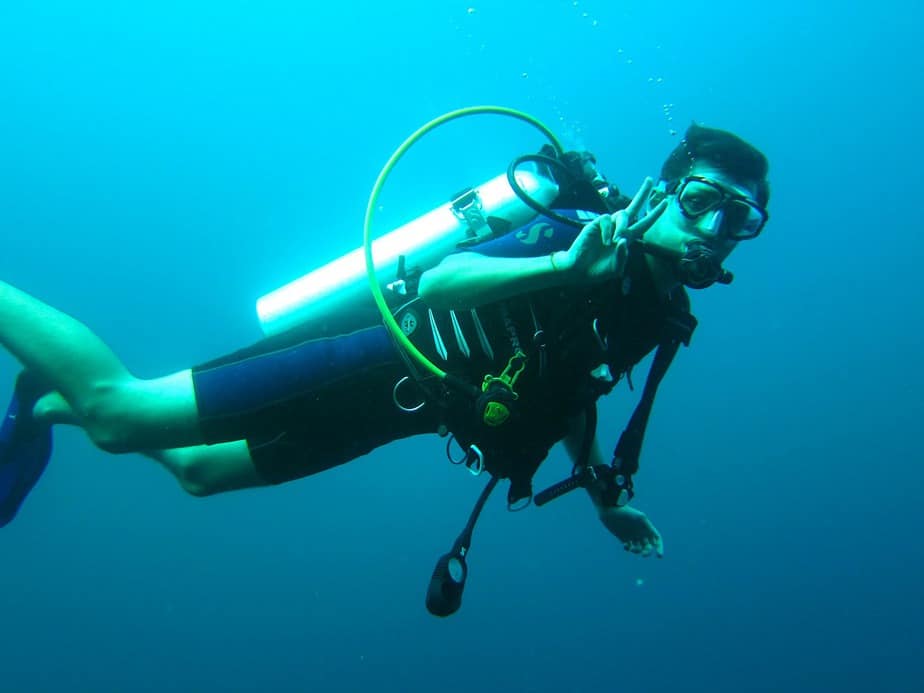
While people have been snorkeling and freediving for centuries, comparatively scuba diving is a relatively young sport. It was only in recent decades that scuba technology and the sport of diving became safe enough to be done and taught widespread.
Thus, the long term effects of breathing are still unclear. The Divers Alert Network (DAN) made the observation in 1995 that:
“More research is needed, but the world is filled with many divers who have been diving for over 40 years who show no unusual deterioration in their abilities which would affect their quality of life.”
Put into context, the above quote was in reference to fears that scuba diving causes brain damage.
The 2017 study conducted by ERS regarding how scuba diving affects pulmonary function concluded that its effects depend on the individual. Deep sea divers were found to have some loss in pulmonary function, so there is some evidence that deep diving long-term can be deleterious to one’s lung health.
That same study found that some individual’s lung health could be so negatively affected by scuba diving that even a single recreational dive affected them. In others, it was completely fine. Unless you are one such individual that is so easily affected by diving, then yes, scuba diving is bad for you.
However, if scuba diving is carefully carried out by safe divers who follow the safety procedures, then it can be a great way to promote good health and fitness through exercise. Recreational diving is generally considered to be good for one’s health in the same way that swimming is good for one’s health.
If you’re unsure if your health permits you to safely scuba dive, then it’s best to see a hyperbaric doctor for a checkup.

